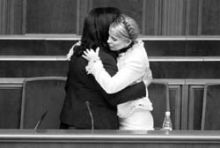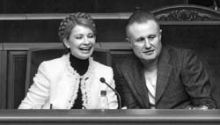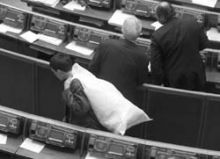Last Friday the Verkhovna Rada passed a virtually new 2005 budget in the first reading by a majority of 376 votes. This impressive result proves that there is no influential parliamentary opposition. If it existed, this would have been proved by the results of the voting on three key points: the confirmation of the prime minister in office, and the approval of cabinet’s program and the budget. It should be recalled that the prime minister and her program obtained almost the same number of “aye” votes as the budget did.
On March 25 parliament made a second attempt to do a difficult and extremely important job, to discuss and pass the budget, as cabinet and its supporters had promised shortly before. To tell the truth, when parliamentarians postponed the vote from Thursday to Friday, in spite of the prime minister’s claim about the “100%” likelihood that it would be passed, the ministers’ confidence shrank and no “100-%” forecasts were made. But from the very beginning of the debate it was clear that there would be no serious disagreements between cabinet and the MPs that would prevent parliament from passing the budget. Most observers were inclined to believe that the budget would definitely be passed - if not on Friday, then at worst during the next extraordinary session.
According to Minister of Finance Viktor Pynzenyk, who presented the draft budget in parliament, the government of Ukraine proposes a UAH 6.8-billion state budget deficit in 2005, while budgetary expenditures will come to UAH 115.3 billion. The draft also provides for zero growth of the public debt and minimal pensions at the level of UAH 332 a month. The state will allocate UAH 8.5 billion for higher wages and fringe benefits.
The minister says the Ukrainian government is continuing the policy of domestic borrowing, recalling that cabinet has already issued 7-year bonds at 6.74% per annum. “We are going to borrow again in the nearest future on even cheaper terms,” said he. Mr. Pynzenyk also cited other budgetary figures that we won’t bother repeating; the media, including The Day, has devoted a lot of coverage to them.
One of the main reference points that help MPs decide on how to vote for a certain item is a standing committee’s opinion; in this case the budget committee. The Budget Committee’s attitude can also be considered a good indicator that the budget stands a fair chance of being passed because there are quite a few political (and only political) opponents of cabinet in this committee. From this standpoint, the situation was developing quite optimistically for the government: first deputy chairperson of the budgetary committee Liudmyla Suprun (NDP-Republic faction) recommended that parliament approve the bill on changes to the 2005 state budget as a whole, not just in the first reading. “The changes have essentially improved the budget. We can pass it as a ready law, not in the first reading,” she said. Ms. Suprun also said that what was needed to pass the budget is “understanding and a political decision that we are taking this step for the sake of the Ukrainian people, the economy, and development.” She announced that, as a result of the talks between cabinet and parliament, total budget revenues are going to drop by UAH 1 billion, which may be offset by raising the deficit by UAH 1 billion, accounting for 1.5% of the GDP. In addition, she said, cabinet had agreed to defer the cancellation of VAT exemptions for farmers until January 1, 2006. At the same time, the other rapporteur, a member of parliament’s Finance Committee Vitaly Khomutynnyk, suggested that budgetary amendments be passed in the first reading only. The MPs can “make official and meaningful proposals on behalf of the committee” only in preparation for the second reading, Mr. Khomutynnyk said.
This means that the dispute between cabinet and its most radical (if this is the proper word in this situation) opponents from the former pro-governmental elite now turns on certain budgetary items. The fact that the new opposition accepted the budget in the first reading means that this dispute did not touch on any essential points.
It is difficult not to share the view of Budget Committee member Valeriy Asadchev: the cabinet-proposed budget was destined to be approved for the simple reason that it contains too many crowd-pleasing items, which is very important as the parliamentary elections are nearing, even though many provisions of the budget law are damaging to the economy. “I think it (the budget — Ed.) will be passed because there is no critical mass of people here who know what this can lead to. Everyone wants to be loved by the electorate,” Mr. Asadchev said. Parliamentary Speaker Volodymyr Lytvyn voiced almost the same opinion, “That the budget will be passed is a foregone conclusion. The question is in what format: in the first reading or as a whole? The speaker called the new budget one that is designed to implement election promises, not a development budget. “This budget calls for meeting the commitments made by the previous government and declared by the new one, as well as meeting the commitments made during the election campaign. Unfortunately, it is obvious that this is not a development budget,” the Verkhovna Rada chairman said.
Last Friday, parliament also appointed 6 members of the Auditing Chamber to replace those who were dismissed upon completing their term of office. Voting by secret ballot, the MPs elected Oleksandr Yaremenko as deputy chairman of the chamber, Antoly Yukhymchuk as secretary, and Larysa Kvitkivska, Ihor Zaremba, Vyacheslav Pylypenko and Heorhiy Samus as chief comptrollers.












